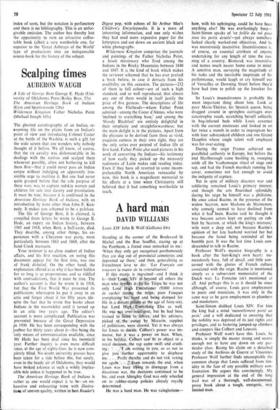A hard man
DAVID WILLIAMS
Louis XIV John B. Wolf (Gollancz 84s) Standing at the corner of the Boulevard St Michel and the Rue Soufflot, staring up at the Pantheon, a friend once remarked to me: `When they only get recognised posthumously they are dug out of provincial cemeteries and deposited up there,' and then, generalising as Frenchmen love to do: 'Les Francais ont toujours la manie de la centralisation.'
If this mania is ingrained—and I think it is—theetottiv XIV iSkbeyond all others the
man wbo typifies Titipu he was not only Lord' High EiteCutioner (9;000 !elms de cachet during the reign; poor Fouquet overplaying his hand and being dumped for life in a distant priSbn at the age of forty-six), but Lord High EyetYthiiig Else as well. He was not ovei=intelligent, but he had been trained to iistM to -advice; and his advisers, picked -at„ the -outset by Mazarin, supplest of politicians, were shrewd. Yet it was always for Lbuis to decide. C..6Ibert's power was im- mense, but it was a power on loan. When, in his heyday,' Colbert save-fit to object to a royal decision;; the rap came swift and crush- ing: `. . .4*.aitt writing to you, so as not to give yoti '-further opportunity to displease me. . . . Profit thereby and do not risk vexing me agatn.'. 44.-R,ven- towards the end, when Louis was busy -tng to disengage from a disastrous war, the decisions continued to be his, and even Almighty God was‘only wheeled on to rubber-stamp policies already royally determined.
He was a hard man. He was Vainglorious— how, with his upbringing, could he have been anything else? He was everlastingly busy- Saint-Simon speaks of `ce foible du roi pour tous les petits details'—yet always somehow lacked clearly worked-out objectives. And he was monstrously insensitive. Insensitiveness is, of course, an essential -attribute of anyone undertaking for any length of time the run- ning of a country. Bismarck was insensitive and names much nearer home come to mind. A sensitive man, surveying the magnitude of his tasks and the inevitable ineptitude of his performance, would laugh or cry himself out of Versailles or Downing Street before they'd have had time to polish up the knocker for him.
So Louis's insensitiveness is probably the most important thing about him. Look at poor Marie-Therese, his Spanish queen, being dragged around in springless carriages over catastrophic roads, scratching herself solitarily in bug-infested beds while Louis cavorted with the current mistresses and looked in on her twice a month in order to impregnate her with four substandard children and one Grand Dauphin whose single talent well employed was for over-eating.
During the reign France achieved un- paralleled authority in Europe, but before the end Marlborough came bustling in, sweeping aside all the Vaubanesque ritual of siege and sap, and had the French marshals running for cover, sometimes not fast enough to avoid the indignity of capture.
Yet in spite of military disasters war and soldiering remained Louis's primary interest, and though the arts flourished splendidly during his reign he himself was a philistine. He once asked Racine, in the presence of the widow Scarron, now Madame de Maintenon, why comedy seemed to have declined from what it had-been. Racine said he thought it was because actors kept on putting on rub- bish by Scarron, at which the king's mistress/ wife went a deep red, not because Racine's opinion of her late husband worried her but because she hated being reminded of her humble past. It was the last time Louis con- descended to talk to Racine.
Professor Wolf's massive biography is a book after the Sun-King's own heart: tre- mendously busy, full of detail, and little con- cerned with the glories of French culture associated with the reign. Racine is mentioned simply as a subservient memorialist of the Dutch war; La Fontaine isn't mentioned at all. And perhaps this is as it should be since although, of course, Louis gave employment to poets and musicians, it was only in the same way as be gave employment to plumbers and musketeers.
Saint-Simon disliked Louis XIV. For him the king had a mind `naturellement pone an petit,' and a will dedicated to ensuring that the nobility was deprived of its just rights and privileges, and to fostering jumped-up climbers and creepers like Colbert and Louvois.
Professor Wolf won't have this. Louis, he thinks, is simply the master strong and secure enough not to have any down on any par- ticular class. Basing his claim on a detached study of the Archives de Guerre at Vincennes Professor Wolf further finds unacceptable the common charge that Louis suffered from -tim- idity in the face of any possible military con- frontation. He argues this convincingly. My general impression at the end of the long trail was of a thorough, well-documented, prosy book about a tough, energetic, very limited man.






































 Previous page
Previous page